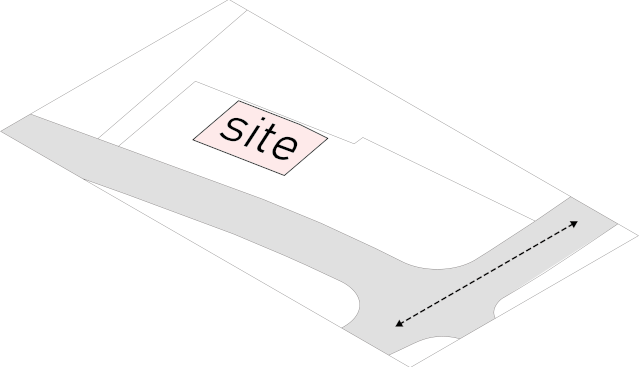查看完整案例


收藏

下载
提炼 · 演绎
大华·清水湾示范区地处天津市河东区,东临北月牙河,西接万东道,具备丰富的城市景观资源和紧靠场地的自然水系,同时周边配套设施完备,交通便利。
本案旨在秉承城市传统文化,在现代化建筑设计手法的基础上融入天津文化元素,打造一个能够承载天津艺术文化的建筑。
Dahua Qingshuiwan Demonstration Zone is located in Hedong District, Tianjin, bordering north Yueya River in the east and Wandong Road in the west. It has rich landscape resources and natural water systems close to the site. At the same time, it has perfect surrounding supporting facilities and convenient transportation.
This project aims to uphold the traditional culture of the city, incorporate Tianjin cultural elements on the basis of modern architectural design techniques, and create a building that can carry Tianjin's culture and art.
▲ 区位分析
示范区基地轮廓呈现为由西向东的长方形,东面紧靠滨河步行道,西面通过一个亲子主题公园与城市道路——万东路相接,示范区与主题公园互相呼应呈现天津城市文化元素。
The outline of the site is a rectangle from west to east. The east side is adjacent to the riverside walkway, and the west side is connected with the urban road-Wandong Road by a child theme park. The demonstration area and the theme park echo each other and present the cultural elements of Tianjin.
▲ 元素提取
曲艺,起源于春秋,兴盛于唐宋,近代达到鼎盛时期。天津由于自身的人文地理环境因素,更是被誉为我国的曲艺之乡,天津和曲艺,相辅相成,天津孕育和包容了曲艺,曲艺融入了天津,成为天津的一部分。而在戏曲中让人最印象深刻就是戏曲所独有的装扮——水袖,在本方案中,我们将这一元素提取出来融入进建筑的立面设计中。
Opera originated in the Spring and Autumn Period, flourished in the Tang and Song Dynasties, and reached its peak in modern times. Due to its own cultural and geographical environment, Tianjin is also known as the hometown of Chinese opera. Tianjin and opera complement each other. Tianjin tolerates and nurtures opera, and opera is integrated into Tianjin and becomes part of Tianjin.The most impressive thing in opera is the unique costume of opera-water sleeves. In this proposal, we extracted this element and incorporated it into the facade design of the building.
▲ 建筑体块生成
三层的建筑体量以戏曲元素“水袖”为立面造型主体。为了能够最大化表达戏曲水袖的概念,我们并没有对建筑进行复杂的空间切割,从而保留出大面积平整的立面空间来与设计元素融合。在立面设计过程中,我们首先在立面上设置突出的空间来丰富里面层次,同时营造建筑入口空间以及一层室外灰空间,在二层未出挑的立面部分采用三角形斜向幕墙的设计手法,丰富立面元素的同时又能够引导建筑内人员的视线,将河道景观通过视线引导来进行最大化利用。亲子公园的景观设计也同样采用了“水袖”元素,通过柔和的曲面元素与建筑立面形成“一柔一刚”的对景。
The three-story building volume takes the opera element "water sleeve" as the main body of the facade. In order to maximize the expression of the concept of opera water sleeve, we did not carry out complex spatial cutting of the building, thus retaining a large area of flat facade space is integrated with the design elements. In the façade design process, we first set up prominent spaces on the façade to enrich the inner layers, and at the same time create the building entrance space and the outdoor gray space on the first floor, and use the triangular diagonal curtain wall design on the unexposed facade on the second floor. The technique can not only enrich the elements of the facade, but also guide the sight of the people in the building, and maximize the utilization of the river landscape through the sight. The landscape design element of the parent-child park also adopts the "water sleeve" element, forming a "softness and rigidity" contrast with the building facade through softly curved surface elements.
▲ “水袖”景观与建筑互相呼应
空间 · 对话
▲ 示范区总体景观与人行动线叙事分析
▲ 示范区总体景观与建筑鸟瞰
▲ 示范区入口
▲ 示范区入口(夜景)
通过水袖的立面设计元素营造出了一个入口灰空间,将立面整体分割成两个部分,并且通过侧向幕墙来过渡两个部分。
An entrance gray space is created through the facade design elements of the sleeves, the facade is divided into two parts, and the two parts are passed through the side curtain wall.
▲ 立面出挑
出挑的立面为一层室外营造出了一个灰空间,在建筑室外周围可提供给人们游览休憩的空间,增加示范区的展示面。
The overhanging façade creates a gray space for the exterior of the first floor, and provides space for people to visit and rest around the exterior of the building, increasing the display area of the demonstration area.
▲ 立面出挑空间
立面的出挑空间的侧面采用玻璃幕墙,在为上层空间提供更好的河道景观的同时又能让二层空间与下层空间产生一定的视线交流。
The side of the protruding space of the façade adopts a glass curtain wall, which not only provides a better river view for the upper space, but also allows a certain line of sight communication between the second-floor space and the lower space.
▲ 侧向玻璃幕墙
在立面上下层空间的过渡手法上,我们采用侧向玻璃幕墙的手法来丰富立面元素,同时我们通过使用三角形的侧向玻璃幕墙来引导室内视线,最大化地利用北月牙河的景观优势。
In the transition method between the upper and lower floors of the façade, we use the technique of lateral glass curtain wall to enrich the façade elements. At the same time, we use the triangular lateral glass curtain wall to guide the indoor sight and maximize the use of the landscape advantages of the North Crescent River.
▲ 立面灯光
为了再次强调建筑与戏曲元素的融合,我们通过灯光来强调、刻画“水袖”这一戏曲原色,通过立面的灯光来突出立面元素。在立面灯光的烘托下,上层与下层空间的比例幕墙元素相较于“水袖”元素就显得通透,起到强调主体的作用。
In order to re-emphasize the integration of architecture and opera elements, we use lights to emphasize and portray the primary color of "water sleeves", and use facade lights to highlight facade elements. Against the backdrop of the facade lighting, the proportional curtain wall elements of the upper and lower spaces are transparent compared to the "water sleeve" elements, which emphasize the main body.
考虑到示范区之后需要配套物业用房空间,在最大程度上保留原有建筑以及景观设计的前提下,计划在示范区建筑(2层)上加建5层空间作为物业用房。这样做的目的是为了在不破坏原有规划的情况下做到拆改量最小,可直接施工,材料直接利用,避免浪费的目的。
Taking into account the need for supporting property housing space after the demonstration area, while retaining the original buildings on the largest scale and the alignment of the landscape design, it is planned to add 5 floors of space to the demonstration area building (2 floors) as property housing. The purpose of this is to minimize the amount of demolition and modification without destroying the expected planning, direct construction, and direct use of materials to avoid waste.
▲ 按后期要求改造后效果图
在实际的项目落地过程中,我们秉持着高度还原设计的宗旨。
▲示范区入口效果图
▲示范区入口建成效果
▲示范区主立面效果
▲主立面建成效果
▲侧立面效果
▲侧立面建成效果
至臻细节 · 品质呈现
外立面定下简约主义风格,以玻璃、瓷砖、转印铝板的结合为主,通过现代设计手法来融合中国传统戏曲主题。
The exterior façade sets a minimalist style, mainly combining glass, ceramic tiles, and transfer aluminum plates, and incorporates the themes of traditional Chinese opera through modern design techniques.
立面主体材料以玻璃和白色瓷砖为主,一层整体为通透的落地玻璃幕墙,二层部分面积采用瓷砖和转印铝板作为外表皮,三层为屋顶层,为了使建筑整体更加协调,采用玻璃幕墙作为围挡,协调整体比例。
The main material of the facade is mainly glass and white ceramic tiles. The first floor is a transparent floor-to-ceiling glass curtain wall. The second floor uses ceramic tiles and transfer aluminum panels as the outer skin. The third floor is the roof layer. In order to make the building more coordinated, The glass curtain wall is used as the enclosure to coordinate the overall proportion.
▲墙身节点
▲墙身节点
▲墙身节点
项目档案
开发企业 大华(天津)房地产开发有限公司
建筑设计 PTA上海柏涛
设计团队 第一事业部
设计主创 陈凌
团队成员 佟聪、周浩武、郑玄、吴凯庆、蔡夏麒、杨智隆、王瑜言、孔德针、沈志远、国久远、姚继林、林怡、李赟
景观设计 上海广亩景观设计有限公司
室内设计 上海羿方建筑设计工程有限公司
项目地点 中国·天津
用地面积 6000平方米
建筑面积 4300平方米
设计时间 2019年
开放时间 2020年09月
摄 影 山兮建筑空间摄影 陈远祥
客服
消息
收藏
下载
最近
































